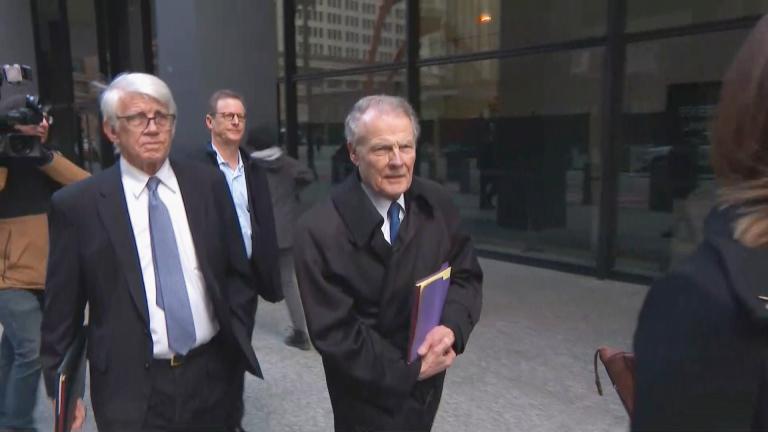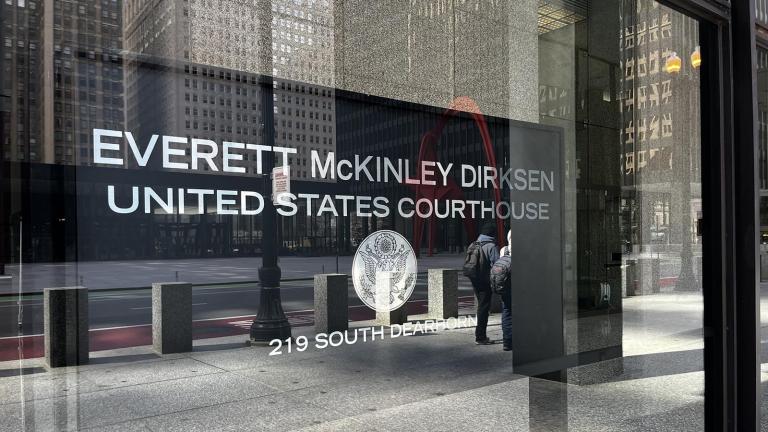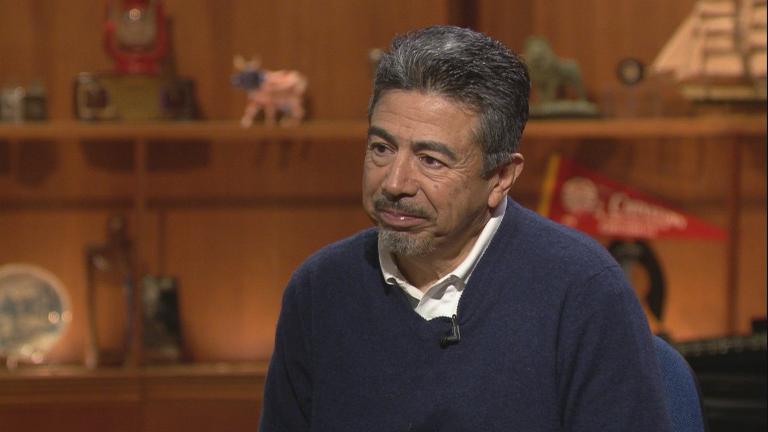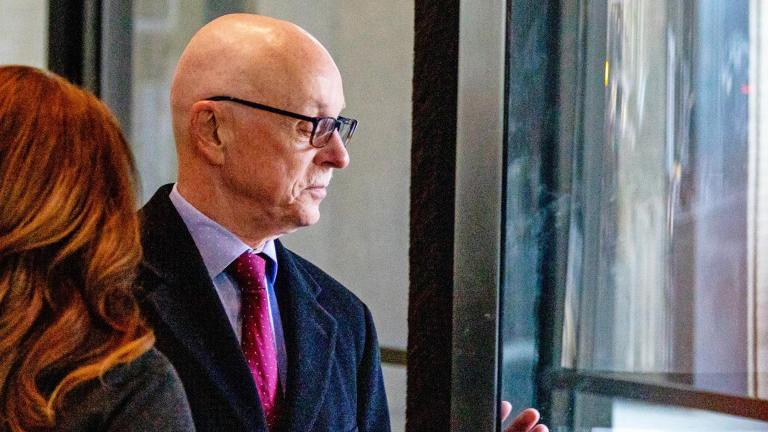 Tim Mapes is pictured at the Dirksen Federal Building on Aug. 7, 2023. (Capitol News Illinois)
Tim Mapes is pictured at the Dirksen Federal Building on Aug. 7, 2023. (Capitol News Illinois)
Tim Mapes, who spent decades in Michael Madigan’s inner circle while serving as the ex-Illinois House Speaker’s chief of staff, was sentenced to 30 months in federal prison Monday after he was convicted last year of lying under oath to protect his former boss.
U.S. District Judge John Kness handed down the sentence during a hearing in a Chicago courtroom Monday — more than five months after Mapes was convicted of making false declarations and attempted obstruction of justice.
“This is a sad case to me,” Kness said during sentencing. “This is a very sad case because I don’t understand why you did what you did.”
The judge noted Mapes, 69, had an immunity agreement with the government and faced no personal risk by testifying as long as he told the truth — something the jury found that he failed to do, repeatedly.
“Perhaps this was out of some sense of loyalty,” Kness said, “but if that was the case, your loyalty was greatly misguided.”
Mapes, who will begin serving his sentence June 11, spoke briefly during Monday’s hearing, saying he appeared before the court “humbled and remorseful.” He lamented the toll this case has taken on his family and described himself as a lifelong public servant who only sought to make life better for people throughout Illinois.
“I also recognize that many people in the state of Illinois have lost faith in their government,” he said, “and that breaks my heart.”
Mapes testified under an immunity deal before a grand jury in 2021 that was investigating Madigan and his longtime confidant Michael McClain. McClain and three other ex-Commonwealth Edison officials were convicted last April of conspiring to bribe Madigan to further the utility company’s legislative agenda in Springfield.
According to prosecutors, Mapes could have been a star witness for the government, but instead chose to repeatedly “protect the boss” when he lied under oath at least seven times during that proceeding in an attempt to minimize the relationship between Madigan and McClain.
Assistant U.S. Attorney Julia Schwartz said these were “brazen and calculated” lies that were designed to help protect Madigan and McClain.
“The defendant made a choice,” she said Monday. “He chose loyalty to his two friends over telling the truth.”
During his grand jury questioning, Mapes was asked if McClain had given him “any insight into what his interactions” with Madigan were “that you weren’t privy to personally?” He allegedly replied: “No, that wouldn’t — that wouldn’t happen.”
Schwartz said this was just one example of answers Mapes gave that were designed to “shut down further questioning”
He also claimed McClain hadn’t told him “what he was discussing with (Madigan) or anything that he was doing on behalf of (Madigan)” and said he didn’t recall “any sort of tasks or assignments” McClain would have performed for Madigan from 2017 to 2019. Despite this interference, Madigan was still indicted and is set to go to trial on racketeering charges alongside McClain in October.
At Mapes' trial, the government called more than a dozen witnesses to testify, but its case was largely built on numerous wiretapped phone conversations presented to jurors, which showed Mapes and McClain were in contact repeatedly throughout 2017, 2018 and 2019.
The calls ranged in time from just a few seconds to several minutes and included discussions on an array of topics including benign items like lunch meetings and doctor’s appointments, to more substantive discussions around Mapes’ resignation and McClain’s “assignment” to tell ex-state Rep. Lou Lang that he should leave office amid sexual harassment allegations.
Mapes himself resigned as Madigan’s chief of staff and as executive director of the Democratic Party of Illinois in 2018 after separate sexual harassment allegations were made against him.
Mapes’ defense attorney Andrew Porter argued that Mapes “did not interfere with the government’s investigation” and should have been allowed to refresh his memory during his grand jury testimony “unlike … almost every other witness with whom the government spoke in this investigation.”
According to Porter, Mapes was simply a staffer working for Madigan, but he said the two were never friends despite their decades alongside one another. He also added that Mapes was never “in the room when it happened, if it happened,” when Madigan and McClain had any alleged discussions related to the ComEd bribery scheme.
“He wasn’t in those conversations and no witness has said that he was,” Porter said. “Tim has to sort of prove a negative, and that is he didn’t know what they were doing.”
Porter said that while his client “accepts the jury’s verdict … he disagrees with it and continues to maintain his innocence.”
Assistant U.S. Attorney Julia Schwartz wrote in the government’s sentencing memo that such a statement shows that Mapes “still refuses to accept responsibility for his actions.”
Prosecutors had asked Kness to sentence Mapes to between 51 and 63 months in prison, arguing that he chose to “willfully obstruct” the government’s sprawling investigation. Mapes’ defense team requested a sentence of time served along with supervised release and a “significant portion” of community service.
While Kness agreed that the government’s sentencing range was more appropriate under the law, he left it was an “odd fit” for this particular case, pointing to Mapes’ age, lack of criminal background and unlikelihood to reoffend. He said a five-year prison term “overstates the seriousness” of the offense, but added that sentencing Mapes to probation would “be the wrong message to send.”
He pointed to the numerous public corruption cases that have been charged in Illinois and said Mapes’ sentence needed to send a message that political power players convicted of a crime won’t get a pass.
“I can’t ignore that,” Kness said of Illinois’ ignominious corruption history. “The people of the state cry out for accountability.”
Kness also called the defense’s argument that Mapes would have testified truthful if he had simply been allowed to refresh his memory “borderline offensive.” He said it wasn’t the government’s responsibility to prep Mapes before his grand jury testimony, and that if his trial jury felt he had simply forgotten things “they would have acquitted you.”
Contact Matt Masterson: @ByMattMasterson | [email protected] | (773) 509-5431








